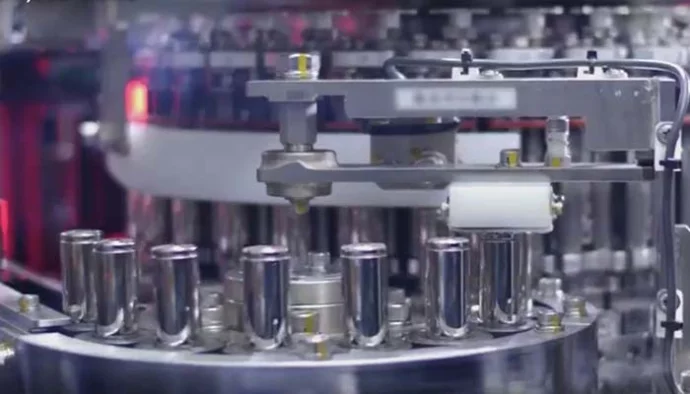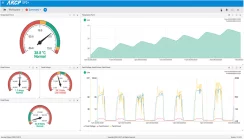The Advantages of Lithium Batteries in Data Centre UPS Systems
As data centres become increasingly critical to the global economy, ensuring uninterrupted power is paramount. With uninterruptible power supplies (UPS) at the heart of the critical power path, the choice of battery technology plays a key role in improving resilience, lowering operational costs, and enhancing uptime. While valve regulated sealed lead-acid (VRSLA/SLA) batteries have traditionally dominated the UPS industry, lithium-ion (or Li-ion) batteries are now gaining traction due to their superior performance, efficiency, and reliability.
However, not all lithium batteries are created equal. Different lithium chemistries offer varying benefits and are suited to specific use cases. In this article, we’ll explore the different types of lithium batteries, their advantages and disadvantages, and which are most suitable for UPS applications in data centres.
An Overview of Lithium-Ion Battery Technology
Lithium-ion batteries are a family of rechargeable batteries that use lithium ions as the primary component of their electrochemical reaction. Unlike VRSLA batteries, which rely on lead-acid chemistry, lithium-ion batteries offer higher energy density, longer cycle life, faster charging, and better efficiency. These attributes make them particularly well-suited for high-performance and mission-critical environments like data centres.
We’ve also become used these characteristics in terms of mobile phones and tables, and electric vehicles. So why not use them in Data Centre applications?
Types of Lithium Batteries
The key differentiator among lithium-ion batteries lies in their chemical composition. The type of lithium compound used in the cathode and the type of material used for the anode impact the battery’s energy density, lifespan, thermal stability, and cost. Below are the most common types of lithium batteries and their relevance to UPS applications:
Lithium Iron Phosphate (LiFePO4)
Lithium Iron Phosphate, or LFP, is one of the most stable and safe lithium-ion chemistries. It has a slightly lower energy density compared to other lithium types but compensates with excellent thermal stability, long cycle life, and robustness.
Advantages
- Thermal Stability: high resistance to overheating and thermal runaway, reducing the risk of fire or explosion.
- Cycle Life: offers up to 3,000–5,000 cycles, significantly outlasting SLA batteries and many other lithium chemistries.
- Lower Degradation: retains capacity well over time, even with deep discharges.
- Environmentally Friendly: contains non-toxic materials, making it easier to recycle.
Disadvantages
- Slightly lower energy density compared to other lithium chemistries like Nickel Manganese Cobalt (NMC).
- Heavier than some alternatives, though still lighter than SLA batteries.
- Ideal for data centre UPS and facilities that prioritise safety and reliability, particularly in environments with fluctuating temperatures or high discharge demands.
Lithium Nickel Manganese Cobalt Oxide (NMC)
NMC batteries use a combination of nickel, manganese, and cobalt in their cathodes. This chemistry balances energy density and lifespan, making it one of the most popular choices in electric vehicles and consumer electronics.
Advantages
- High Energy Density: provides more power in a compact form, reducing the physical footprint of a UPS system.
- Versatility: suitable for high-performance and energy-dense applications.
- Balanced Performance: offers a good compromise between cost, weight, and lifespan.
Disadvantages
- More prone to thermal runaway compared to LFP.
- Higher cobalt content increases costs and environmental concerns.
- Well-suited for space-constrained data centres needing compact, high-performance UPS batteries, though proper thermal management systems are critical.
Lithium Nickel Cobalt Aluminum Oxide (NCA)
NCA batteries are similar to NMC but with an even higher energy density and longer lifespan, often used in high-performance applications like electric vehicles (EVs).
Advantages
- Exceptional Energy Density:provides significant power in a smaller size, ideal for space-constrained environments.
- Long Lifespan: can last for 2,000–4,000 cycles with proper management.
- High Performance: offers quick charge and discharge capabilities.
Disadvantages
- Expensive due to cobalt and nickel content.
- Lower thermal stability, requiring robust battery management systems (BMS) for safety.
- Best for niche applications where space and performance are critical, but high cost and safety risks limit its widespread use.
Lithium Manganese Oxide (LMO)
LMO batteries are known for their high power output and thermal stability, often used in power tools and medical devices.
Advantages
- Thermal Safety: stable at high temperatures, reducing fire risks.
- High Power Output: suitable for applications requiring rapid bursts of power.
Disadvantages
- Shorter lifespan (500–1,000 cycles) compared to other lithium chemistries.
- Lower energy density.
- Less commonly used for UPS applications due to shorter lifespan, but may be appropriate for specific high-power applications.
Lithium Titanate (LTO)
LTO batteries use lithium titanate as the anode material, offering unparalleled cycle life and fast charging capabilities.
Advantages
- Ultra-Long Cycle Life: up to 10,000 cycles, making it ideal for long-term reliability.
- Fast Charging: charges more quickly than most other lithium chemistries.
- High Safety: exceptional thermal and chemical stability.
Disadvantages
- Expensive, with a lower energy density than NMC or LFP.
- Bulkier design due to lower energy density.
- Best for applications prioritising longevity and safety, but high costs make it a niche choice.
The Five Key Factors for Selecting Lithium Batteries for Data Centre UPS
Below we list 5 factors that should be considered when selecting a data centre UPS with lithium battery backup.
- Safety and Reliability: thermal runaway is a critical concern in data centres. LFP batteries are the safest option, with excellent thermal stability and a low risk of fire or explosion. While NMC and NCA batteries offer higher energy density, they require advanced BMS to mitigate safety risks.
- Lifespan and Total Cost of Ownership (TCO): lithium-ion batteries, particularly LFP and LTO, offer far longer lifespans than SLA batteries. Though their initial costs are higher, their durability reduces replacement frequency, lowering the total cost of ownership.
- Energy Density and Space Constraints: for data centres with limited space, NMC and NCA batteries provide high energy density in a compact form, enabling smaller UPS designs.
- Environmental Impact: sustainability is a growing priority for data centres. LFP batteries are environmentally friendlier due to their non-toxic composition, while cobalt-heavy chemistries like NMC and NCA have higher environmental costs.
- Cost: while Li-ion batteries are more expensive upfront than SLA batteries, LFP offers a good balance of performance and affordability for data centres.
The Recommended Lithium Battery for Data Centre UPS
For most data centre UPS applications, Lithium Iron Phosphate (LFP) batteries are the most suitable choice. They provide a strong balance of safety, lifespan, energy efficiency, and cost-effectiveness, making them ideal for ensuring resilience and reducing downtime.
In cases where space constraints are critical, Lithium Nickel Manganese Cobalt Oxide (NMC) batteries may be preferred due to their higher energy density. However, careful thermal management is essential for safe operation.
The Benefits of Lithium Batteries in Data Centre UPS
- Improved Resilience: lithium batteries provide faster response times, longer lifespans, and better performance under load, ensuring uninterrupted power during outages.
- Lower Operating Costs: their energy efficiency and longer replacement cycles reduce energy bills and maintenance expenses.
- Enhanced Uptime: high reliability minimizes the risk of power disruptions, supporting continuous data centre operations.
For more information on lithium batteries in uninterruptible power supplies see:
https://www.cibsejournal.com/technical/battery-technology-vrla-or-li-ion-batteries/
For more information on the risks of using lithium batteries in data centres see:
https://www.datacenterdynamics.com/en/opinions/ignore-li-ion-fire-risks-at-your-peril/#:~:text=Lithium%2Dion%20(Li%2Dion,%2Destablished%20lead%2Dacid%20units
Conclusion
Lithium batteries are set to revolutionise uninterruptible power supplies for data centres, in much the same way as they have mobile technologies and automobiles. For data centre applications they offer enhanced resilience, cost savings, and operational reliability. While various lithium chemistries are available, LFP batteries stand out for their safety, longevity, and sustainability, making them the optimal choice for most data centres. By carefully selecting the right lithium battery type, operators can future-proof their power infrastructure, ensuring uninterrupted service and uptime.

























